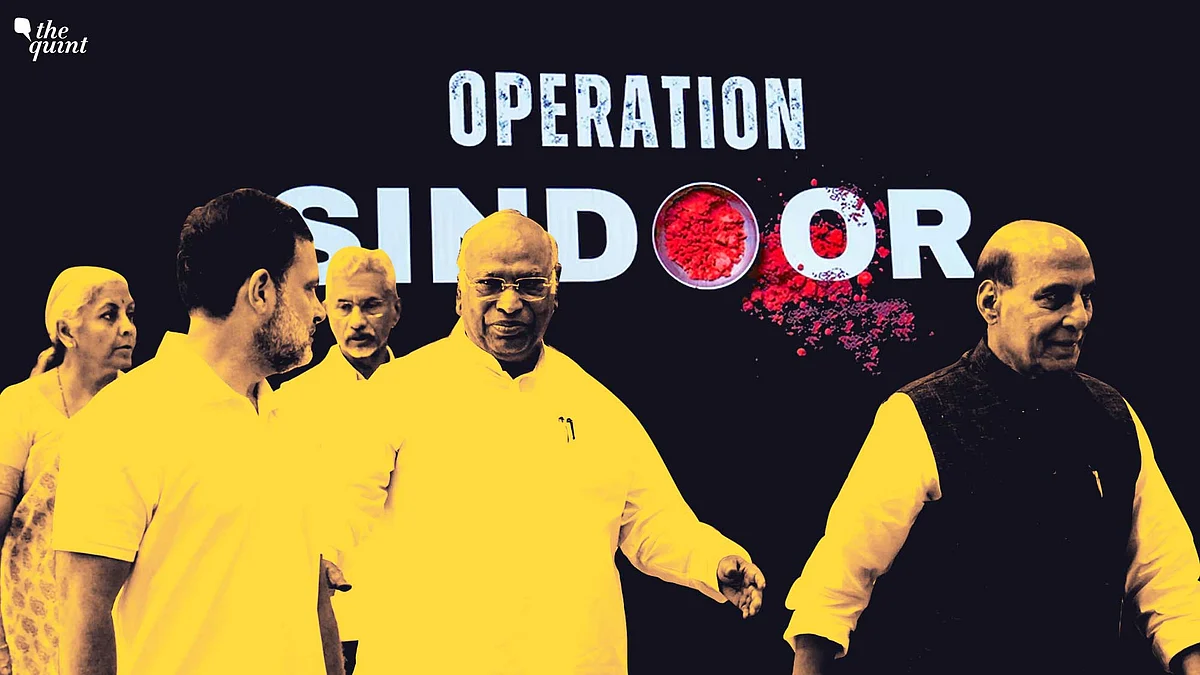
Trump Has Left Cracks in BJP's Op Sindoor Narrative. Can Congress Turn the Tide?
The question with which the Congress is grappling is this: how much should it escalate, and how quickly?

advertisement
The most heartening aspect of the recent India-Pakistan conflict has been a rare display of unity between the Modi government and the Opposition.
In sharp contrast to belligerent criticism— led mostly by the Congress—during the 1999 Kargil war under the Vajpayee government, and the Modi government’s surgical strikes in Pakistan after terrorist attacks in Uri in 2016 and Pulwama in 2019, this time, the mood in the Opposition, including the Congress, has been one of 'solidarity' and support.
However, since then, there have been several developments that could see this truce unravelling, given the polarising nature of today’s competitive politics.
Tweets, Tirangas, and Tensions
One is the tweet from the Bharatiya Janata Party's (BJP) official handle barely 24 hours after the all party pact against politicisation. The tweet listed terror attacks during ten years of UPA rule and called out the Congress for its 'passivity'.
Even Congress leader Shashi Tharoor, who has been largely sympathetic to the Modi government’s handling of the current crisis, was compelled to criticise the BJP and demand that the tweet be deleted.
The third development, and perhaps the most potent, is the salvos from Washington in the form of tweets, press conferences, and statements by US President Donald Trump who seems to be taking great delight in punching holes in the Modi government’s narrative of the Pahalgam terrorist attack, Operation Sindoor, and its aftermath.
Trump Throws a Curveball
There is plenty of ammunition in Trump's comments for the Opposition to go on the offensive against the government, should it choose to do so. This is where the dilemma for the Congress comes in.
Ironically, the criticism did not play out well, with the attacks and the subsequent nationalist narratives the BJP conjured securing the latter a huge political advantage in not one but two big elections, the Lok Sabha elections in 1999 and again in 2019.
Drawing on lessons learnt from its earlier mistakes, the Congress has been particularly cautious this time, restricting itself to asking for a special session of Parliament and/or an all-party meeting chaired by Prime Minister Narendra Modi to express the nation’s solidarity and reiterate the resolve to retake Pakistan Occupied Kashmir (PoK), as expressed in a 1994 Parliament resolution.
In the past few days, Trump has claimed many things.
He boasted of how the US had "mediated" the ceasefire between India and Pakistan.
He claimed the two countries "will start talks on a broad set of issues at a neutral site’’.
He asserted that he "threatened to stop all trade with both nations unless they agreed to de-escalation and avert a nuclear war".
He suggested the two countries "go out and have a nice dinner".
All these claims and assertions are too explosive for the Congress to ignore. And so, naturally, the questions have started popping up—carefully framed, for once, seeking information instead of hurling criticism, with the party looking keen on avoiding the temptation of Modi-baiting.
Dilemma Over Escalation
The day after Trump’s first tweet, which pre-empted India and Pakistan to announce the two countries had agreed to a full and immediate ceasefire after a "long night of talks brokered by the United States", the Congress sprung to action.
Wasting no time, it fielded its suave general secretary Sachin Pilot to ask the government to clarify whether it had accepted third-party mediation in violation of India’s long-held policy of bilateralism in all dealings with Pakistan.
Pilot also urged the government to take note of Trump’s remarks and reaffirm that Kashmir is a bilateral issue and no country, including America, has the space to intervene.
It seems the Congress is unwilling to let matters rest here, and is currently in the throes of chalking out its next steps. As Congress MP and strategic affairs expert Manish Tiwari said, "There are hard questions that need to be asked. We would be remiss in our duty to the people of this country if we don’t ask them."
The question with which the Congress is grappling is this: how much should it escalate, and how quickly?
It knows that there is no chance of the government conceding to its demand for a special session of Parliament, or for the PM to chair an all party meeting. It will have to wait till the monsoon session at the end of July to seek answers, debate, and discuss what is threatening to turn into India’s most serious foreign policy crisis yet.
Till then, Congress sources admit that they have no option but to keep up the pressure through press briefings, social media, and other tools available to them.
It must ask serious, reasoned questions about India’s geopolitical position post Trump’s bid to re-hyphenate India and Pakistan. But in doing so, it must be ready for the risk of opening itself up to the BJP's tried and tested tactic against dissenters - that of being labelled anti-national.
In the battle of narratives, Modi has always come out ahead. The Congress will have to tread very cautiously in these difficult times.
(Arati R Jerath is a Delhi-based senior journalist. She tweets @AratiJ. This is an opinion piece, and the views expressed above are the author’s own. The Quint neither endorses nor is responsible for the same.)
- Access to all paywalled content on site
- Ad-free experience across The Quint
- Early previews of our Special Projects
Published: 14 May 2025,01:46 PM IST